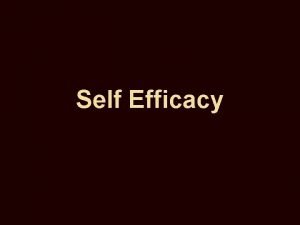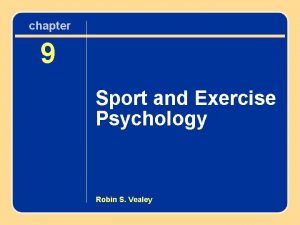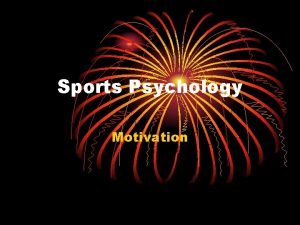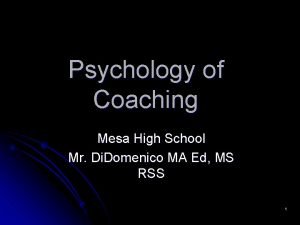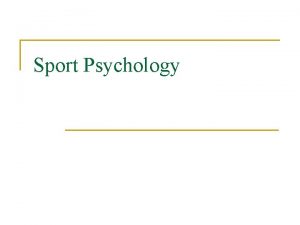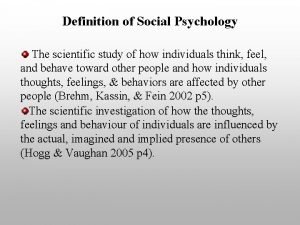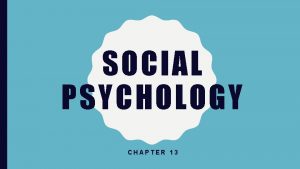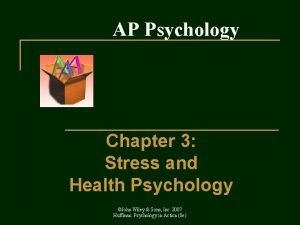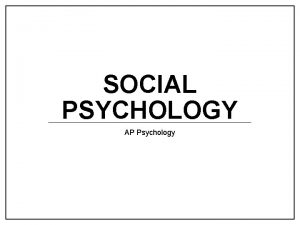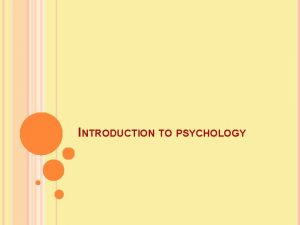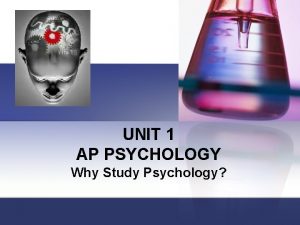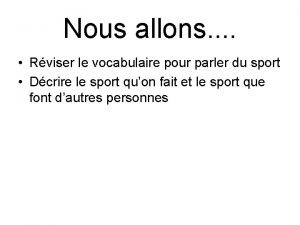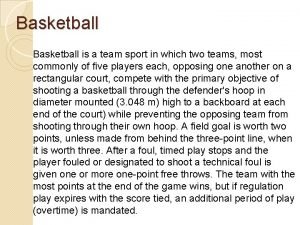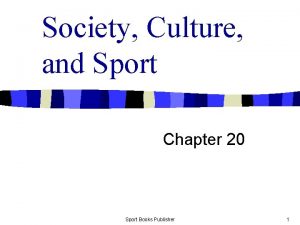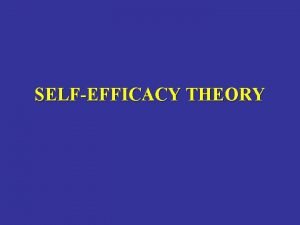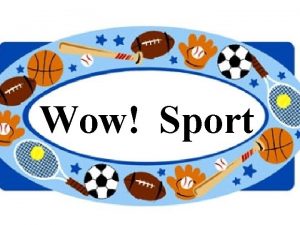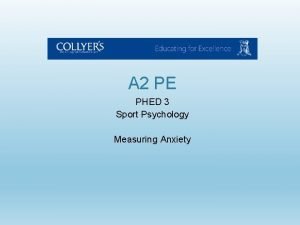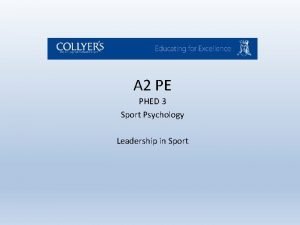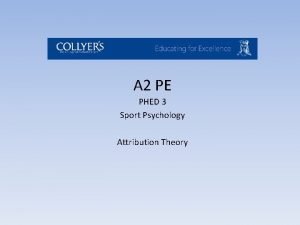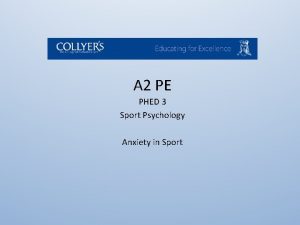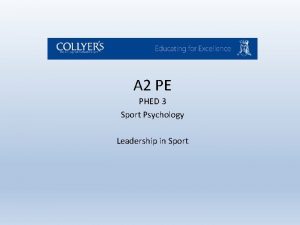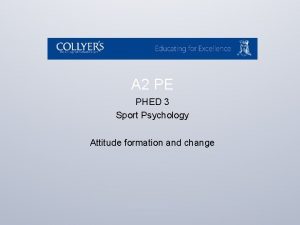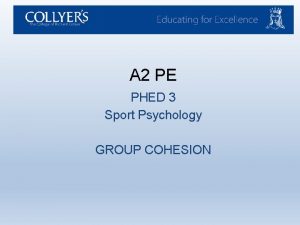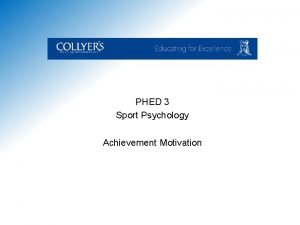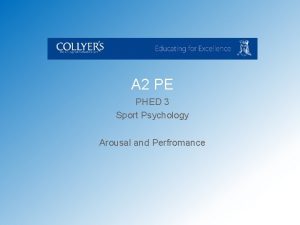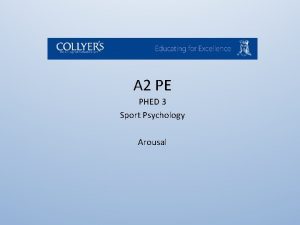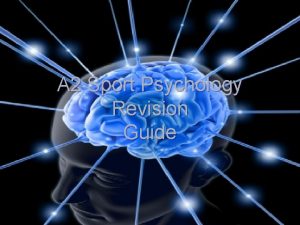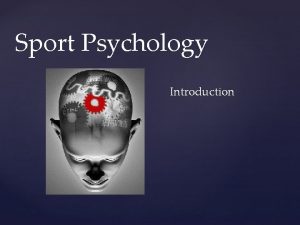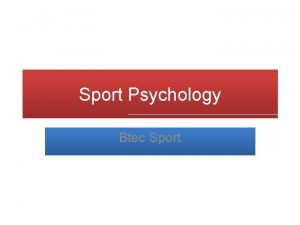A 2 PE PHED 3 Sport Psychology SelfEfficacy


















- Slides: 18

A 2 PE PHED 3 Sport Psychology Self-Efficacy

Confidence and Efficacy What is confidence and efficacy? How can they be increased? What affect does an audience have on performance?

Confidence is defined as. . “Having a strong belief in one’s own ability to achieve success” Key aspect at elite level sport- Confident athletes expect to do well � Can often be the only difference between people who are evenly matched � Lack of confidence can lead to doubt and under-performance � Fernando Torres at Chelsea

Discuss �‘the most significant difference between elite and less successful athletes is that elite athletes possess great self confidence’ �What would happen if an elite athlete lacked self confidence?

Self Efficacy? �What is the difference between self confidence and self efficacy?

Characteristics Low self efficacy Kevin Garnett vs Michael Jordan High self efficacy

How does self efficacy affect you? �Choice of activity �Amount of effort applied �Level of persistence

What causes a reduction in selfefficacy? � 1. Lack of success, which may lead to learned helplessness and the need for attribution retraining � 2. When the coaches goal-setting becomes too ‘outcome’ oriented rather than performer oriented, i. e. , the coaches desire to win a championship results in unrealistically high expectations of the performer. � 3. The feedback from the coach becomes too negative which will have the effect of verbal persuasion � 4. The external rewards are restricted to the “best” performers rather than to all who achieve their targets.

Bandura’s model

Self efficacy Bandura defined Self Efficacy as situational specific confidence which is based on 4 primary sources of information Performance accomplishments Vicarious experiences Self Efficacy Verbal Persuasion Emotional arousal Performance accomplishments • What you have achieved in training and competition forms basis of future expectations. • Success leads to positive expectations and enhanced self belief- Coaching implications Vicarious experience • Seeing someone else achieve success can help motivate you and give belief. • Needs to be someone of a similar ability to be effective. Verbal Persuasion • Use of careful reasoning to show others have faith in performer’s ability • Could also be done in the form of self talk Emotional arousal • Interpretation of somatic signs of anxiety- Increased Heart Rate means you are

Task �You are the coach of Michael Jordan. He is going through a rough patch and is showing signs of low levels of self efficacy. Using Bandura’s model how could you turn this around. �Discuss in pairs and then write four paragraphs. �This could be part of a 14 mark question. How? Why not the full 14 marks?

Increasing Self Efficacy � Ensure individual achieves success � Manipulate training environment (Successful and positive reinforcement) � Playing very winnable games(More difficult at elite level) � Effective Goal Setting � SMARTER- Especially realistic so that success is possible � Goals should emphasise individual targets rather than team � Encouraging cognitive methods of controlling anxiety (already covered) � Self talk � Imagery and Visualisation � Ensure any routines/superstitions can be maintained � Increase motivation using extrinsic rewards � Important not to be overused

The effect of an audience Theory of Social facilitation (Zajonc) The behavioural affects due to the presence of others. � Split into 2 forces- Audience and Co-action (Teammates or opponents) Found that the presence of others. . . � Helped well learnt or simple skills (Facilitation) � Hindered new or complex skills (Inhibition) Links back to Drive Theory as increased arousal (from presence of others) increases the likelihood of dominant response being given. It is clear now that not all ‘others’ will have the same effect. . . Evaluation Apprehension � When we think we are being assessed or judged the effects will be


The effect of an audience (Cont. . ) Distraction-Conflict theory (Baron) Presences of audience linked to information processing � Suggests audience takes up much of our Attentional capacity � Presence creates higher levels of arousal � Might not be able to cope with a more complex or newly learnt task Demands of task Athlete performin g CONFLICT Distraction of audience Increased Arousal Social Facilitation

Limiting the effects of an audience � Learn new skills in the absence of an audience �Dominant response � Gradually introduce an audience once skill can be accomplished �Initially in training before competition � Encouraging cognitive methods of controlling anxiety (already covered) �Self talk �Imagery and Visualisation � Increased Self Efficacy �Performance accomplishments �Vicarious experiences �Verbal Persuasion �Emotional arousal

Home-Field Advantage Common feeling in sport that a team playing at home has an advantage- But do they? It is generally seen that more support will result in a better performance. . . �Audience can create “Functional Assertive behaviour” �Home team playing more ‘aggressively’ �More effect the higher the standard of the sport �Increased Arousal = Increased Drive = Dominant response = Social Facilitation �Increased anxiety for away team �NFL

However… the pressure of an expectant crowd can have negative effects on performance � More self conscious leading to over arousal �Catastrophe theory � Evaluation Apprehension due to expectant crowd � Potential Social Inhibition if not at elite level or complex skills � Key factors in determining the effect of a crowd. . . �Size of crowd �Proximity Theory - How close to the pitch? �Importance of game and how hostile crowd are (Choke effect)
 Phed phed rosebery
Phed phed rosebery What is selfefficacy
What is selfefficacy Sport and exercise psychology definition
Sport and exercise psychology definition Definition of motivation in sport psychology
Definition of motivation in sport psychology Psyc 1504 learning journal unit 1
Psyc 1504 learning journal unit 1 Sport psychology history
Sport psychology history Social psychology definition psychology
Social psychology definition psychology Altruism definition psychology
Altruism definition psychology Health psychology definition ap psychology
Health psychology definition ap psychology Fundamental attribution error ap psychology
Fundamental attribution error ap psychology Explain methods of psychology
Explain methods of psychology Positive psychology ap psychology definition
Positive psychology ap psychology definition Korea institute of sport science
Korea institute of sport science Ozodlik-salomatlik garovi
Ozodlik-salomatlik garovi Sabakiball
Sabakiball Parler du sport
Parler du sport Basketball is a team sport in which two teams
Basketball is a team sport in which two teams Sport
Sport What is the oldest sport in the uae?
What is the oldest sport in the uae?

